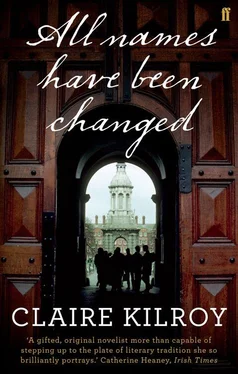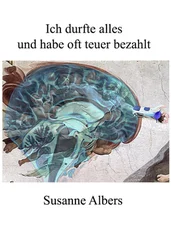Claire Kilroy - All Names Have Been Changed
Здесь есть возможность читать онлайн «Claire Kilroy - All Names Have Been Changed» весь текст электронной книги совершенно бесплатно (целиком полную версию без сокращений). В некоторых случаях можно слушать аудио, скачать через торрент в формате fb2 и присутствует краткое содержание. Год выпуска: 2010, Издательство: Faber & Faber, Жанр: Современная проза, на английском языке. Описание произведения, (предисловие) а так же отзывы посетителей доступны на портале библиотеки ЛибКат.
- Название:All Names Have Been Changed
- Автор:
- Издательство:Faber & Faber
- Жанр:
- Год:2010
- ISBN:нет данных
- Рейтинг книги:5 / 5. Голосов: 1
-
Избранное:Добавить в избранное
- Отзывы:
-
Ваша оценка:
- 100
- 1
- 2
- 3
- 4
- 5
All Names Have Been Changed: краткое содержание, описание и аннотация
Предлагаем к чтению аннотацию, описание, краткое содержание или предисловие (зависит от того, что написал сам автор книги «All Names Have Been Changed»). Если вы не нашли необходимую информацию о книге — напишите в комментариях, мы постараемся отыскать её.
All Names Have Been Changed — читать онлайн бесплатно полную книгу (весь текст) целиком
Ниже представлен текст книги, разбитый по страницам. Система сохранения места последней прочитанной страницы, позволяет с удобством читать онлайн бесплатно книгу «All Names Have Been Changed», без необходимости каждый раз заново искать на чём Вы остановились. Поставьте закладку, и сможете в любой момент перейти на страницу, на которой закончили чтение.
Интервал:
Закладка:
Brigid — for that was her name, the Arklow woman in the shedding mohair cardigan that Sunday afternoon in the pub in Leeds — Brigid wasn’t in the least bit surprised when her mother told her that young Glynn was studying to enter the priesthood. And she wasn’t in the least bit surprised either, she was quick to add, when her mother told her the following year that young Glynn was only after spoiling his vocation. ‘I’d put nothing past Patsy!’ said Brigid with glee, ‘and look it, wasn’t I right?’ I laughed. Glynn with a Christian name? Ludicrous. Brigid laughed too, for different reasons, I assume. She flicked through the pages of my paperback edition of Prussian Blue and snorted in begrudging admiration before passing the book back. ‘A gas man for the sermons still, I see.’
As a young fella of no more than seven or eight years, Patsy refused, Brigid informed me, to play Mammies and Daddies or Doctors and Nurses with all the other little boys and girls on his road, instead devising his own game, which he called Mass. Mass was conducted in Patsy’s back garden. He was always the priest, and the other children were always his flock. ‘Father,’ they had to call him. ‘Yes my child,’ he would reply. None of them ever questioned this arrangement, no one dared to bags the top job from him. Glynn organised his congregation into rows and made them sit, and sometimes kneel, to listen to his sermons in dutiful silence. Brigid corrected herself: there was nothing dutiful about their silence; the children were spellbound. Gobsmacked was the word she used. ‘The things he came out with!’ she cried. ‘And the little size of him!’ Everything she uttered had an exclamation mark attached, now that she’d hit her stride. I bought her another sherry.
Glynn scared the living bejaysus out of his playmates, issuing arcane threats of damnation that he surely could not spell; Brigid shuddered in lurid recollection, visibly enjoying her day out. Other times, the children were seduced by his lyrical descriptions of Paradise, or regaled with knuckle-whitening stories about bible characters which were entirely fabricated. The stories were fabricated, that is, not the characters. Glynn appropriated names from the Bible — Moses, John the Baptist, Mary Magdalene, Saul — and threw in some period detail to lend the thing an air of authenticity; sandals, locusts, olive trees and whatnot.
The children grew confused as to what was actually in the Bible and what most certainly wasn’t, Glynn’s stories being so much more memorable than the real thing, and that, I have come to believe, is the measure of a good novel. ‘They stayed with you,’ Brigid observed, ‘do you know what I mean? The trouble he got us into with Sister Mercedes!’ Sister Mercedes had to set the kids straight with a cane.
Once a week, young Glynn heard confession. This was a grave, terror-inducing business conducted in the pitch darkness of the coal shed. The children kneeled beside the nettle patch, Brigid related, and prayed to the garden wall until the shed door creaked open an inch or two and Glynn’s finger beckoned through the chink. The little ones used to cry. Why they actually waited there like frightened lambs and didn’t run off to play normal games with normal children, Brigid would never know. All this, Glynn would argue, is merely hearsay.
This desire to sermonise was misinterpreted by the religious orders as evidence of a vocation, and a seventeen-year-old Glynn found himself packed off to Maynooth with another hundred or so boys similar to him, and probably worse than him, knowing the state of the country then, forties Ireland, mother of God, was there no end to it? The forties dragged on until the seventies. This was hardly the plan, not by a long shot, not to get banged up with them yokes, up there chewing the altar rails. Where were the women, for a start? After an interlude of spiritual reflection, Glynn, now nineteen, discovered that his calling wasn’t in fact to serve the Lord after all, but rather to find a flock. And there were easier ways of coming by an audience, what with his talent. I am, it should be said, surmising.
Brigid did not grasp the significance of her anecdote: that Glynn had managed by the tender age of eight to captivate his first audience. His mesmerising faculty with language was evident from the outset, his strange power with words was apparent even then. The audacity of coupling biblical names with historical props to fashion a narrative so authentic that the local kids accepted it as, well, Gospel — you had to hand it to the little chancer, you had to take off your hat. The man was born to hold a pen in his hand.
Brigid stubbornly refused to see the matter in those terms. She had formulated strong opinions of her own regarding Patsy Glynn’s coal-shed evangelising and seemed crestfallen, even a little bitter, when I didn’t endorse them, when I declined to add my voice to her round condemnation, on the contrary finding it increasingly difficult to contain my mounting excitement. It marked the end of our association.
The timing of my chat with Brigid turned out to be auspicious. Just one of those things. A sign, if you like. A mere matter of weeks later, and a full three years after the five of us had individually, unbeknownst to each other, scattered throughout the soggy audience of approximately two hundred, attended Glynn’s Royal Irish Academy reading, I found myself entirely by chance face to face with the man himself. I had never seen him in daylight before. What a pallor he had on him.
It was the Christmas of 1984, and I was home in Ireland for the holidays. I’d just that morning come up on the bus from Mayo to visit friends in Dublin when he joined me at the pedestrian lights on the Ha’penny Bridge, also waiting to cross. There we suddenly were, standing side by side on the banks of the Liffey one brisk breezy afternoon in late December, regarding each other none too warmly. Seagulls with wingspans as broad as eagles wheeled and screamed above the great writer’s head, part of the aura he carried everywhere, the raucous extension of his mind into the sky. Glynn protested a lifelong interest in the avian world, coastal species in particular: gulls of all types, terns, gannets, cormorants, guillemots — they feature prominently in his work.
Though I knew the contours of his face almost as well as I knew my own, I still did a double take to make sure it was really Glynn. He looked somehow contrived; not Glynn, but a man dressed up as him. Surely the real Glynn should not have to try so hard to resemble himself, and still not fully succeed? He was shivering despite it being an unseasonably pleasant afternoon, sunny enough to force us both to squint, or, in his case, scowl. In retrospect, it seems likely he was enduring one of his health scares at the time. Mortality; another of Glynn’s great topics.
His navy coat was fastened to the throat, the collar turned up around his ears. It looked as naked as a shirt buttoned to the neck without a tie. No one had ever accused Glynn of possessing style. He hadn’t shaved in days, and his cheeks, when he coughed wetly without covering his mouth, puffed out the mauve grey of the homeless. About his person, the various appurtenances with which we were to become so familiar: the umbrella, the high grade hat and, in case there was any doubt as to his occupation, the old chestnut-brown leather satchel from his student days. Glynn had been a Foundation Scholar at Trinity in the early 1950s, an honour he shared with Wilde and Beckett.
A fair to middling crowd of bargain hunters had gathered at the lights, not one of whom had spotted the prodigy walking amongst us. Hibernia had been published three years previously to international acclaim. Glynn must have read the jumble of confusion and zeal on my face, because he regarded me with a harried eye, but it was also a speculative one. This was typical of the man, I would come to learn. Jaded by the attention, but nonetheless courting it. He seemed perpetually on the brink of issuing an observation of literary import, of producing poetic utterance. That’s how it felt to be standing next to him — braced for epiphanic articulation to burst into the world, your hands cupped in readiness to catch it.
Читать дальшеИнтервал:
Закладка:
Похожие книги на «All Names Have Been Changed»
Представляем Вашему вниманию похожие книги на «All Names Have Been Changed» списком для выбора. Мы отобрали схожую по названию и смыслу литературу в надежде предоставить читателям больше вариантов отыскать новые, интересные, ещё непрочитанные произведения.
Обсуждение, отзывы о книге «All Names Have Been Changed» и просто собственные мнения читателей. Оставьте ваши комментарии, напишите, что Вы думаете о произведении, его смысле или главных героях. Укажите что конкретно понравилось, а что нет, и почему Вы так считаете.












